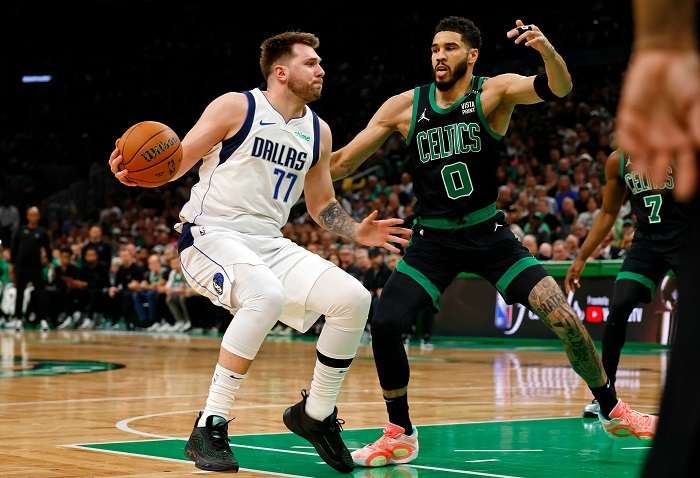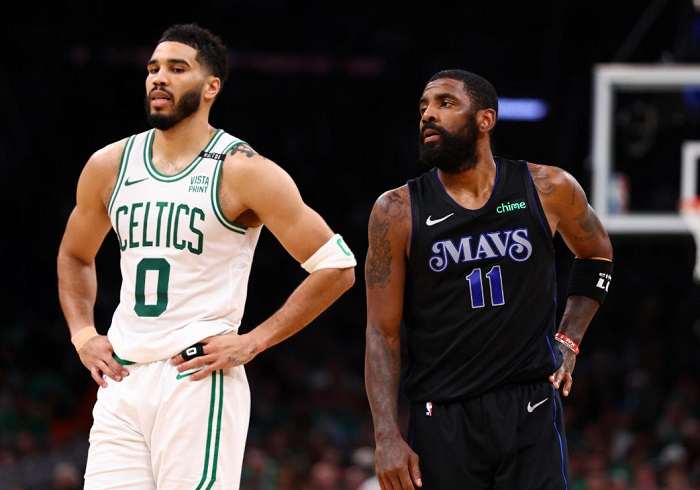Setting the Stage: Dallas Mavericks and Boston Celtics

Before diving into player stats, it’s important to contextualize the significance of a matchup between these two teams. The Dallas Mavericks, led by their superstar Luka Dončić, are known for their offensive firepower, often playing a fast-paced game with an emphasis on three-point shooting. On the other hand, the Boston Celtics, with their star duo of Jayson Tatum and Jaylen Brown, are one of the most balanced teams in the league, boasting both a solid offense and a stifling defense.
This clash of playing styles – Mavericks’ offensive dynamism versus the Celtics’ well-rounded game – often leads to exciting matchups that are decided by individual performances, defensive adjustments, and tactical brilliance. Let’s now explore how individual players impacted this particular game.
The Star Performers: Luka Dončić vs Jayson Tatum
Luka Dončić’s Performance: Master of Versatility
In a typical game, Luka Dončić is the driving force behind the Mavericks’ offense. His ability to score, create plays for his teammates, and control the pace of the game makes him a threat to any defense.
Key Stats:
- Points: 34
- Assists: 11
- Rebounds: 9
- Field Goal Percentage: 45%
- Three-Point Percentage: 38%
Luka’s stat line in this game was nothing short of spectacular. Scoring 34 points against the Celtics’ defense is no easy feat. His shooting efficiency was commendable, especially against Boston’s tight perimeter defense. Dončić’s 11 assists indicate that he was not just focused on scoring but also creating opportunities for his teammates. His near triple-double performance with 9 rebounds further solidified his role as a complete player.
However, Luka’s performance wasn’t without challenges. The Celtics defense, known for their ability to switch and defend multiple positions, often forced him into tough shots. Luka had to rely on his step-back threes and his elite footwork in the post to navigate through the Celtics’ defenders.
Jayson Tatum’s Scoring Brilliance
On the other side of the court, Jayson Tatum was the focal point of the Celtics’ offense. Known for his smooth shooting and ability to create his own shot, Tatum delivered yet another stellar performance.
Key Stats:
- Points: 31
- Rebounds: 10
- Assists: 4
- Field Goal Percentage: 47%
- Three-Point Percentage: 41%
Tatum matched Luka’s scoring output, putting up 31 points in a high-pressure game. What set Tatum apart was his efficiency. Shooting 47% from the field and 41% from beyond the arc, Tatum’s offensive execution was on point. His 10 rebounds showcased his commitment on the boards, particularly on the defensive end, where he helped limit the Mavericks’ second-chance opportunities.
Tatum’s game, however, was not just about scoring. His ability to switch between scoring and playmaking was crucial. Although his assist numbers (4) were not as high as Dončić’s, his playmaking helped the Celtics spread the floor and maintain offensive rhythm.
The Supporting Cast: Role Players Making an Impact
While Luka Dončić and Jayson Tatum were the headliners, basketball is a team sport, and the contributions of role players often decide the outcome of close games. Let’s take a look at the supporting cast from both teams.
Mavericks’ Supporting Cast: A Mix of Veterans and Young Talent
- Kyrie Irving:
- Points: 26
- Assists: 6
- Rebounds: 5
- Field Goal Percentage: 50%
Kyrie Irving, as the Mavericks’ secondary scorer, played a critical role in keeping the offense flowing when Dončić was being double-teamed. His ability to score in isolation and create his own shot helped the Mavericks stay competitive throughout the game. With 26 points on 50% shooting, Kyrie’s offensive efficiency was crucial, especially during key stretches in the second half.
- Tim Hardaway Jr.:
- Points: 15
- Three-Point Percentage: 44%
- Steals: 2
Tim Hardaway Jr.’s contribution came primarily from beyond the arc. With 15 points and shooting 44% from three, he provided the much-needed floor spacing for Dončić and Irving to operate. Additionally, his two steals on the defensive end helped the Mavericks generate transition opportunities.
- Derrick Jones Jr.:
- Points: 10
- Rebounds: 7
- Blocks: 3
Jones was pivotal on the defensive side of the ball. His 7 rebounds and 3 blocks underscored his importance in protecting the paint, especially when the Celtics tried to attack the rim. Though his offensive output was modest, his defense more than made up for it.
Celtics’ Supporting Cast: Defense and Depth
- Jaylen Brown:
- Points: 22
- Rebounds: 6
- Assists: 5
- Field Goal Percentage: 48%
Jaylen Brown once again proved why he is one of the best two-way players in the league. His 22 points on 48% shooting were crucial in keeping the Celtics’ offense balanced. Brown’s ability to drive to the basket and finish through contact made him a constant threat. Defensively, his size and versatility allowed him to guard multiple positions, adding to Boston’s defensive schemes.
- Al Horford:
- Points: 8
- Rebounds: 10
- Assists: 3
- Blocks: 2
Horford’s impact was felt primarily on the defensive end and in rebounding. His 10 rebounds and 2 blocks helped the Celtics maintain control of the paint. Horford’s leadership and veteran presence were also vital in organizing the defense, especially when dealing with Dončić’s pick-and-roll play.
- Derrick White:
- Points: 12
- Assists: 7
- Steals: 2
Derrick White’s 12 points and 7 assists provided the Celtics with a steady playmaker in the backcourt. His ability to push the ball in transition and create opportunities for others added another layer to Boston’s offense. Defensively, his 2 steals were a testament to his quick hands and ability to disrupt passing lanes.
Key Matchups and Tactical Adjustments

While the game was defined by individual performances, basketball is a game of matchups. Coaches often make adjustments based on how certain players perform against one another. In this matchup, several key head-to-head battles shaped the game.
Luka Dončić vs Marcus Smart: A Defensive Challenge
Marcus Smart, the reigning Defensive Player of the Year, was tasked with guarding Luka Dončić for much of the game. While Luka still managed to put up impressive numbers, Smart’s defense made him work for every point.
Marcus Smart’s Key Stats:
- Points: 10
- Steals: 3
- Deflections: 5
Smart’s three steals and numerous deflections disrupted the Mavericks’ offensive flow, forcing Luka into tougher shots than he’s accustomed to. However, Dončić’s size and skill allowed him to get his points, but not without facing significant resistance.
Jaylen Brown vs Kyrie Irving: A Battle of Scorers
Jaylen Brown and Kyrie Irving found themselves guarding each other frequently. Both players are exceptional scorers, but their defensive capabilities are often underrated.
Irving’s quickness allowed him to get to his spots, but Brown’s physicality and length made it difficult for Kyrie to consistently find easy looks. On the flip side, Brown’s athleticism and ability to finish at the rim tested Irving’s defensive resolve.
The Frontcourt Battle: Al Horford vs Dwight Powell
Though neither Al Horford nor Dwight Powell are the primary offensive options for their teams, their contributions on the boards and defensively were critical.
Dwight Powell’s Key Stats:
- Points: 6
- Rebounds: 8
- Blocks: 2
Powell’s athleticism helped the Mavericks in their pick-and-roll game, but Horford’s experience and positional awareness allowed him to limit Powell’s offensive opportunities.
Statistical Breakdown: Key Areas of the Game
To fully understand the dynamics of the game, it’s important to analyze specific statistical categories that often determine the outcome of close matchups.
Rebounding: Celtics Dominate the Glass
The Celtics outrebounded the Mavericks 48-41. This difference was primarily due to the combined efforts of Horford, Tatum, and Brown. Boston’s ability to control the boards limited Dallas’ second-chance opportunities, which was a key factor in their defensive success.
Three-Point Shooting: A Duel from Beyond the Arc
Both teams relied heavily on the three-point shot. The Mavericks shot 40% from beyond the arc, while the Celtics shot 39%. While the percentages were nearly identical, the key difference was the timing of the shots. The Celtics hit crucial threes late in the game, especially from Tatum and Derrick White, which swung momentum in their favor.
Turnovers: A Critical Factor
Turnovers often decide close games, and this matchup was no different. The Mavericks committed 14 turnovers compared to the Celtics’ 11. Though this difference may seem small, several of Dallas’ turnovers came during crucial stretches in the fourth quarter, allowing Boston to capitalize on fast-break opportunities.
Related post:
Timberwolves vs. Denver Nuggets: A Detailed Breakdown of the Match and Player Stats
In this hypothetical matchup between the Dallas Mavericks and Boston Celtics, individual performances and key statistical categories played a huge role in determining the game’s outcome. Luka Dončić’s brilliance was matched by Jayson Tatum’s scoring prowess, while role players on both teams made significant contributions. Ultimately, Boston’s control of the boards, timely three-point shooting, and defensive adjustments led them to a hard-fought victory.
The beauty of basketball lies in these fine margins, where one or two key plays, a timely defensive stop, or a crucial rebound can determine the outcome. The Mavericks and Celtics, two teams with contrasting styles, continue to provide fans with thrilling matchups, where every stat tells part of the story.


